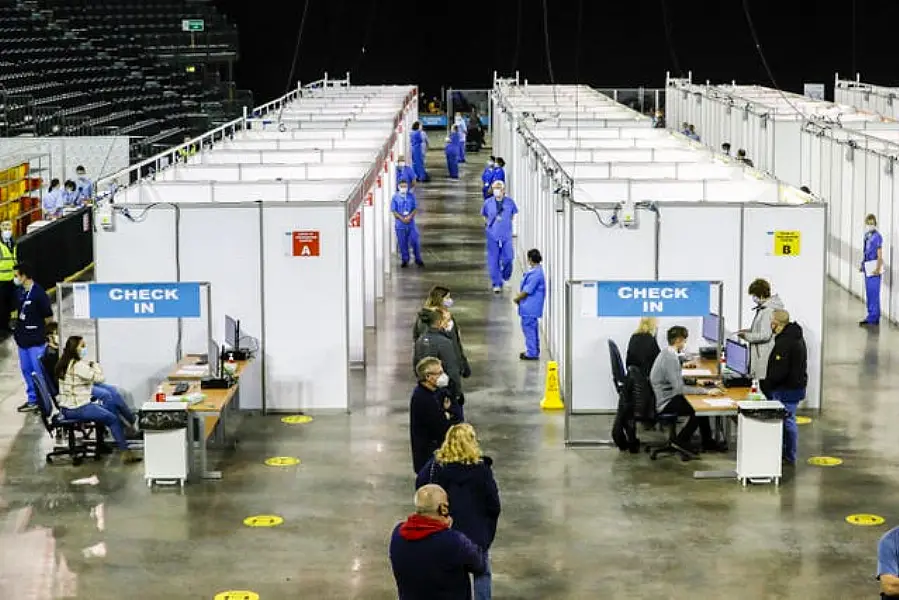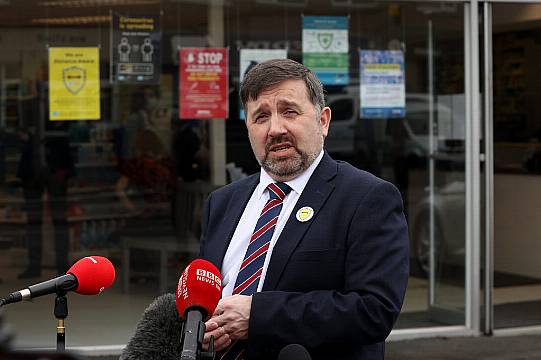Vaccine passports in the North should be limited to international travel and large events, the Health Minister has said.
Robin Swann said he would not be supportive of using vaccine certifications for gaining access to hospitality providers or close-contact service businesses.
A weekly health briefing by Mr Swann and senior health officials also heard that the region’s first consignment of Moderna vaccine was not now expected until June.
The head of Northern Ireland’s vaccine rollout programme, Patricia Donnelly, said “modest amounts” of Moderna were expected in June. She said they would mainly be used for younger people.
In regard to the relatively high incidence rate of the virus recently recorded in the Derry City and Strabane district council area, Mr Swann said the increase had plateaued and was not at the level where consideration of localised restrictions would be required.

The minister also raised “concern” about the disparity in the pace of vaccine rollout between the North and the Republic, but he expressed confidence that the programme across the Border would catch up in the coming months.
Last week First Minister Arlene Foster raised the possibility of the North participating in UK trials on using vaccine passports to allow people to return to large events, such as sporting occasions.
Mr Swann said he was keen to establish whether that approach would work in the region.
However, he made clear that he would not wish to see certification extended to other settings.
“What the First Minister was referring to are some of the trials that have been taken in regards to large-scale venues, large-scale events, actually seeing activities happening without social distancing,” he said.
“So they are, I suppose, trials for very specific types of events in the next step in regard to easements at a UK-wide level.
“We would be keen to see if that’s something that could work in Northern Ireland.
“But the utilisation of Covid vaccine passports to access hospitality or close-contact services is not something that sits comfortably with me.
“But there’s a necessity, or a possibility, for the utilisation for international travel, but not for accessing domestic services and support.”

Ms Donnelly said, as of Tuesday night, 1,174,000 jabs had been administered in Northern Ireland, 876,000 of which were first doses.
She said uptake in all those aged 50 and over was at 90 per cent, rising to as high as 96 per cent in older age groups.
Ms Donnelly said 29,000 people in the 35 to 39 age bracket had booked appointments since the programme was partially opened to that cohort last week.
The senior officials also revealed plans for pop-up vaccine clinics in parts of the North where there were concerns about low uptake, with some areas of social deprivation targeted.
In regard to when Moderna jabs will be rolled out in the region, she added: “We’re not likely to get it until June. It will be one of those vaccines that can be used as an alternative to AstraZeneca. We’re not yet including it in our plan because we have very modest amounts coming now, which creates a difficulty as we can’t really depend on it at this stage.
“But we are likely to use it with the younger age group when it arrives.”
Health Minister - 'We must not ease up against virus.'
➡️https://t.co/jVA9G05G7q pic.twitter.com/nOcFRtQPy7— Department of Health (@healthdpt) April 21, 2021
Mr Swann made clear that there were no plans to alter the sequencing of vaccination to fast-track jabs for younger people, even though they are likely to have the most social contacts in the months ahead.
“We’ve always followed the JCVI (Joint Committee on Vaccination and Immunisation) protocol, which was based on age group, starting from the elderly and most vulnerable and working our way down through that cohort and that’s what we’ll continue to do, it’s worked for us to date,” he said.
In regard to the situation in Derry City and Strabane, where the seven-day average incidence per 100,000 of population is above 100, chief medical officer Dr Michael McBride said there was “no clear explanation” for the “relatively high” case numbers in the area.
He said public health officials on both sides of the border in the North West were examining the situation.
“I would add that this situation appears to be stabilising,” said Dr McBride.
Earlier in the pandemic, localised restrictions were introduced in the council area in response to soaring case numbers.
Mr Swann said the level of transmission was not close to the levels that triggered those restrictions.
“At this moment in time we don’t envisage any need for more localised or focused restrictions in Derry City and Strabane, we’re not at that stage,” he said.
There was one further death of a patient who previously tested positive for Covid-19 announced in the North on Wednesday, along with another 116 positive cases of the virus.
On Wednesday morning, there were 59 confirmed Covid-19 inpatients in hospital, nine of whom were in ICU.
Mr McBride said hospital admission rates continued to fall while ICU numbers remained at a stable and low level.







